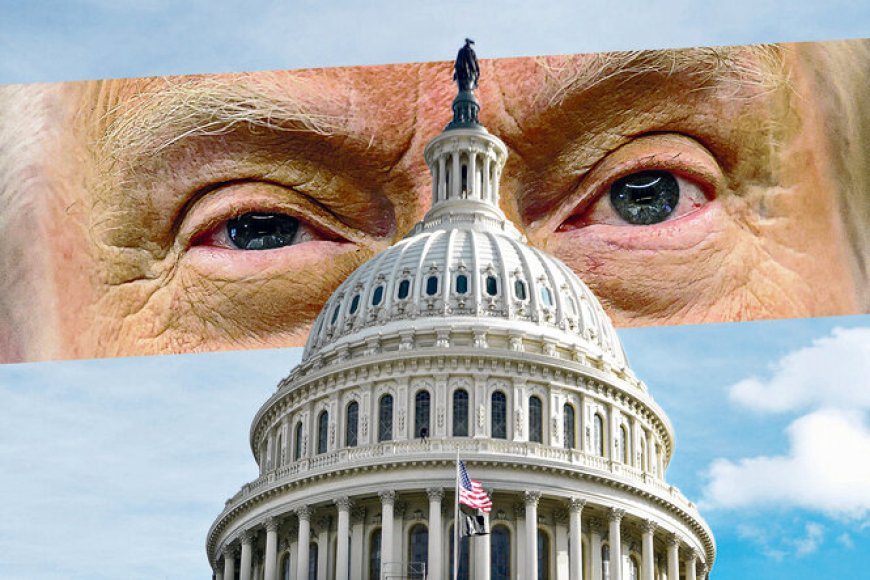Donald Trump versus the rule of law
Whoever saves the country is not breaking any law – Trump's saying is reminiscent of the Nazi lawyer Carl Schmitt, who is popular among right-wing thinkers in the USA.

He who saves his Country does not violate any Law". US President Trump made this statement on Elon Musk's platform. He who saves his country does not violate any law, wrote Trump on X. The statement is often attributed to the French ruler Napoleon Bonaparte - perhaps wrongly. However, some were rightly reminded of the German legal philosopher Carl Schmitt - the "crown jurist" of the Third Reich , who justified the Führer principle, especially in the early stages of Hitler's rule.
At the end of June 1934, Hitler eliminated political enemies and rivals in the Nazi ruling clique in the so-called "Night of the Long Knives" and had up to 200 people killed. Schmitt commented on the murder campaign in the Deutsche Juristen-Zeitung in August : "The Führer protects the law from the worst abuses when, in the moment of danger, he creates immediate justice by virtue of his leadership as the supreme lord of the court."
Schmitt then quotes from a speech by Hitler: “In this hour I was responsible for the fate of the German nation and thus the supreme judge of the German people.”
Now it is not 1933 and Donald Trump is not Adolf Hitler. But it does not take much imagination to hear the echo of history . The strong man who wants to restore a supposedly ailing nation to its former glory. Who defends himself not only against enemies abroad, but also against those at home. And who finds independent courts or parliamentary control annoying. Schmitt also despised the parliamentarism of the Weimar Republic's constitutional state.
Trump's thought leaders read Schmitt
With his posts, Trump continues to follow the bon mot of his ally Steve Bannon: Flood the zone with shit. In this case, one cannot assume that he has previously studied the works of a German legal philosopher. However, we know that the new right thinkers in the USA have certainly read their Schmitt.
One example is the philosopher Curtis Yarvin . In an interview, Yarvin uses Schmitt to criticise the rule of law: "When you look at the question of the rule of law, you realise that it is always the rule of a person who claims to be able to interpret the law." In other words: There always needs to be a judge who dispenses justice.
This situation also upsets JD Vance. The same Vance who has spoken favorably of Yarvin in the past . A week ago, the vice president was outraged on X about a judge who denied Elon Musk and his red tape-cutting committee DOGE access to sensitive Treasury Department payment data. "Judges are not allowed to check the legitimate power of the executive branch," Vance wrote in a direct attack on the separation of powers.
Trump and his co-workers are undermining Parliament in a way that is hardly more subtle. As New York Times columnist Ezra Klein noted , Congress is losing the control function assigned to it in the Constitution, because the Republican Party, which dominates it, hardly thinks about monitoring the president's actions anymore. Instead, it is making itself the lackey and henchman of the Great Chairman.
On the way to the monarchy?
The USA under Trump seems to be fully on Yarvin's course, which calls for an American monarchy. It is interesting that Yarvin also refers to the Democratic President Franklin D. Roosevelt as a role model, during whose term of office from 1933 to 1945 the path to the "imperial presidency" began.
Right-wing lawyers and think tanks in the USA have also been fuelling the "unitary executive theory" for some time. According to this theory, the president is supposedly allowed to exercise unlimited power over the executive branch. Proceedings there could soon show whether the conservative majority of judges on the Supreme Court will apply this theory.
"The wound can only be healed by the spear that struck it," says Richard Wagner's Parsifal. And perhaps only Schmitt himself can help against the "Schmittian" Trump. Schmitt also coined the concept of the "friend-enemy distinction" as a central element of politics, which the left-wing theorist Chantal Mouffe seized on in 2005.
Yes, polarization is not only bad because it at least makes the existing contradictions and existential threats to democracy clearly visible. While the left is still considering what it actually stands for, it can at least know today who it is fighting against.













































